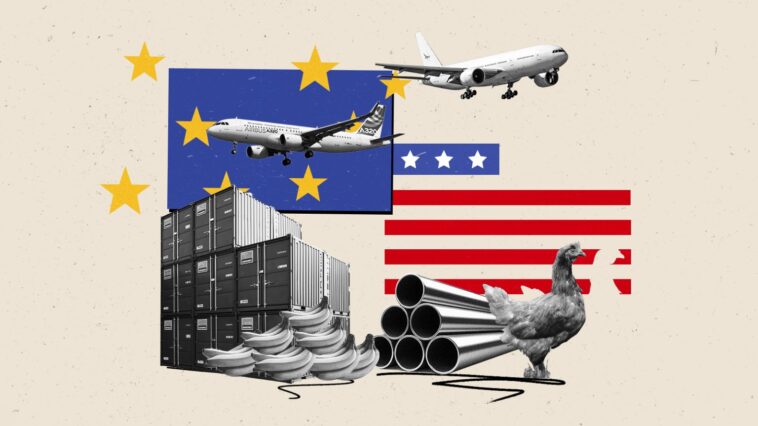In the month of March, Micheal Martin, the Taoiseach of Ireland, had a meeting with President Trump at the White House. This rendezvous occurred several weeks before April 2, classified as Liberation Day, and well before President Trump disclosed plans of his global trade war. Also, these plans preceded the impending 30% tariffs on the 27-nation European Union, planned to be enforced from the start of August. Significantly, Ireland stands as a crucial provider of vital, life-preserving pharmaceuticals to the United States.
The European Union holds a commanding position over numerous medical importations to the United States, encompassing treatments for conditions like diabetes, high blood pressure, depression, and various cancers. Additionally, the EU supplies numerous chemical compounds used in the manufacturing of domestic drugs. Thus, the blow of President Trump’s looming 30% tariffs on the European Union, to be imposed from August 1, are of immense significance to U.S. citizens.
The impact of these tariff considerations exceeds those of previous trade wars initiated by Trump pertaining to various products like cell phones, sweaters, toys, or vehicle parts. A price escalation on crucial medical provisions could severely impact the country’s financially disadvantaged and uninsured population. The European Union has been signaling its disinclination to surrender in this looming tariff conflict, potentially intensifying the situation’s severity.
The trade dispute with the European Union is a distinct scenario. President Trump generally favors bilateral negotiation processes; however, the European Union is a conglomerate of 27 individual nations. It’s worth noting that Trump has postponed the implementation of a majority of the tariffs he initially proposed in early April against the international community, including over 100 countries with which the US has a positive trade balance.
Currently, some baseline tariffs of 10% are already in effect, along with a few industry-specific tariffs. President Trump’s ambitious economic conflict with China, Canada, Mexico, and the European Union strategically targets countries reflecting the most substantial U.S. trade deficits. However, this strategy simultaneously jeopardizes some of the most significant markets for U.S. exports, impairing a critical measure of national economic health in the process.
As per the latest available data until May, the European Union accounts for 20.22% and 18.57% of all U.S. imports and exports, respectively. Looking at the potential consequences of the proposed 30% tariffs on EU that would take effect next August, an analysis was conducted focusing on those categories, where the EU enjoys the highest global market share.
From examining the top 50 categories, which represent 73.29% of all U.S. imports from the EU up until May, it was discovered that of the top 10 categories with the greatest global market share, six were healthcare-related. These categories had an immense global market share, ranging from 62.36% to 99.22%.
The analysis suggested that essential medicines, often pivotal to the health and survival of U.S. citizens, could be heavily impacted by tariff impositions. Simultaneously, U.S. exports fundamental to European health and welfare could also land in the crosshairs. Six of the top 10 U.S. exports, calculated in the same approach as the imports, are in the healthcare sector.
Interestingly, of these six crucial health-related U.S. exports, the European Union holds the market for a significant percentage. Specifically, the EU’s share in these six U.S. exports fluctuated between 46.78% to as high as 98.86%. This situation paints a picture of the intricate interdependencies in healthcare trade between the United States and the European Union.
The impending tariffs present a complex scenario, potentially affecting essential medical supplies imported to the U.S. A mixed ensemble of medicines for treating chronic conditions and essential chemical compounds used in local drug manufacturing stand to be affected should this tariff war escalate further.
Even the beneficial trade surplus the U.S. enjoys with more than a hundred countries may not offer significant cushioning in the face of the broad impacts of these tariffs. More than mere numbers, these figures represent essential goods that sustain lives, regulate health, and ensure the well-being of millions of U.S. citizens.
The bilateral trade between the U.S. and the EU, especially concerning healthcare, illuminates the depth of their mutual dependence. An imposition of the 30% tariffs could have a ricocheting effect, disrupting the balance of trade and potentially impacting critical healthcare provisions for both parties.
While the intricate negotiation process continues, the impending tariff enforcement looms over these intertwined economies. Not only is the healthcare sector of the U.S. at risk, but so is the welfare of the nation’s underprivileged and uninsured population.
As Liberations Day came and went, the biomedical world holds its breath, waiting anxiously for the decision on the impending tariffs. A delay may offer some reprieve, but the uncertainties of the global market provide a sobering reminder of the complex dynamics of international political and economic relations, particularly in the healthcare industry.
The intricate link between healthcare and trade emphasizes the necessity of strategic, balanced negotiations that consider the welfare of citizens on both sides of the Atlantic. As the U.S. stare down this new challenge, the nation is not only confronting a potential economic shift but also the welfare of its healthcare system, and by extension, the well-being of its citizens.

